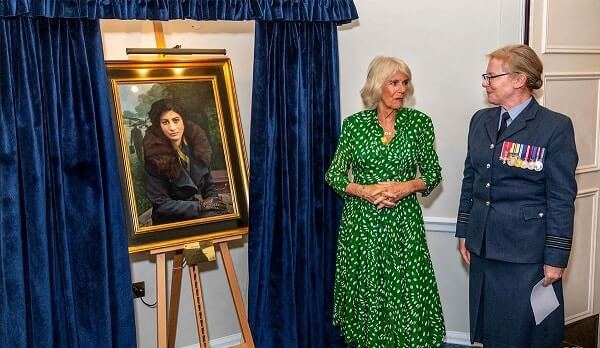British Queen Camilla has unveiled a portrait of Noor Inayat Khan, an Indian-origin spy and descendant of Tipu Sultan at the Royal Air Force (RAF) Club in London recently.
The portrait now hangs opposite the stained glass window, which highlights the roles of Women in the RAF since its inception in 1918, and was inaugurated by the late Queen Elizabeth II in 2018.
Queen Camilla also formally named the room in the club as the “Noor Inayat Khan Room”.
During the visit, she met Shaik Mahmood, Noor Inayat Khan’s cousin, before unveiling the portrait by Paul Brason, a former President of the Society of Portrait Painters.
The 76-year-old senior Royal was also presented with a book, The Spy Princess — The Life of Noor Inayat Khan, a biography of Noor Khan, by the author Shrabani Basu.
Noor was born on January 1, 1914 in a monastery just outside the Kremlin in Moscow to Sufi preacher Hazrat Inayat Khan and American mother, Ora Ray Baker.
She was recruited in 1943 from the Women’s Auxiliary Air Force (WAAF) to Britain’s Special Operations Executive (SOE), which conducted espionage, sabotage, and reconnaissance in occupied countries during the Second World War.
She was the first woman SOE operator to be infiltrated into France, and was landed by Lysander aircraft on June 16, 1943.
“During the following weeks, the Gestapo arrested most of the Paris Resistance Group in which she worked. Despite the danger, Noor refused to return to England because she did not wish to leave her French comrades without communications and she hoped also to rebuild the Group,” the RAF said in a statement.
According to the statement, the Gestapo had a full description of Noor, who they knew only by her code name “Madeleine”, and in October 1943 she was captured by them.
Despite brutal interrogation she refused to give any information, either as to her work or her colleagues.
She was imprisoned at the Gestapo headquarters, during which time she made two unsuccessful attempts at escape, and was then sent to Germany for so called “safe custody”.
“She was considered to be a particularly dangerous and uncooperative prisoner. On September 12, she was moved to Dachau Concentration Camp where she was subjected to further brutal treatment, then taken to the crematorium and shot. Noor displayed the most conspicuous courage, both moral and physical, over a period of more than 12 months,” the RAF said in its statement.
Noor was one of only two members of the WAAF to be awarded the George Cross (GC).
Alongside the Victoria Cross, the GC is the highest award bestowed for acts of the greatest heroism, or for the most conspicuous courage in circumstances of extreme danger.
Following the portrait unveiling, Queen Camilla joined a Reception in the Sovereigns Room attended by members of the Board of Trustees of the RAF Club and serving female RAF personnel representing the RAF Stations of which the Queen is Honorary Air Commodore, and other areas of the RAF.
Read More: The Indian queens who modelled for the world’s first vaccine





